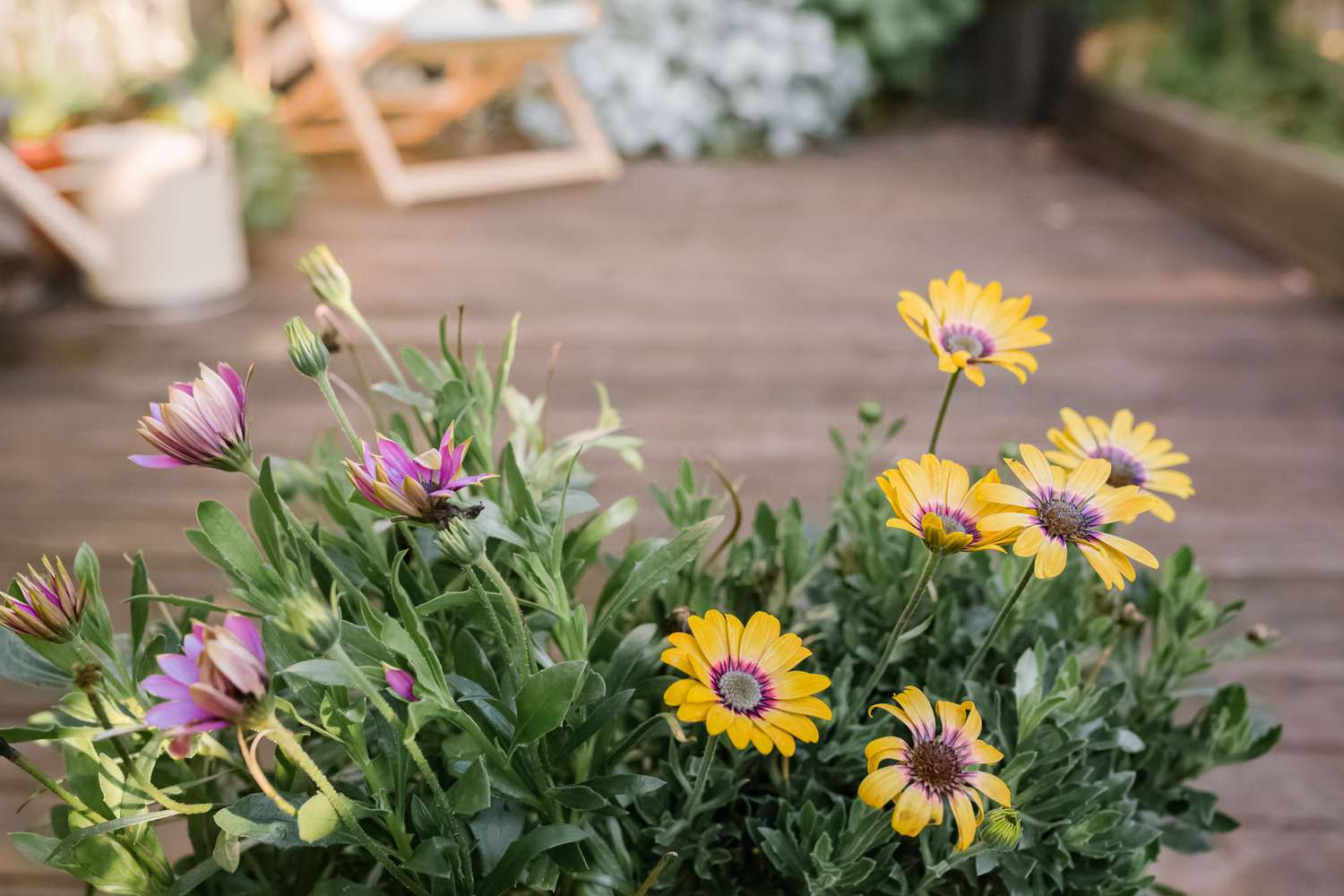
The African Daisy, also known as the Osteospermum, is a vibrant and stunning flower that is native to South Africa. With its unique combination of beauty and resilience, it has become a favorite among gardeners and flower enthusiasts worldwide. While most people are familiar with its striking appearance and ability to thrive in various conditions, there are some surprising facts about the African Daisy that many may not know. From its diverse color variations to its medicinal properties, this remarkable flower has much more to offer than meets the eye. In this article, we will explore 14 surprising facts about the African Daisy that will surely pique your interest and deepen your appreciation for this extraordinary plant.
Key Takeaways:
- African Daisies are vibrant, low-maintenance plants that attract pollinators and have medicinal uses. They symbolize love and new beginnings, making them a versatile and colorful addition to any garden.
- With their long blooming season and drought tolerance, African Daisies are easy to grow and come in varieties for all climates. They make excellent cut flowers and natural insect repellents, supporting biodiversity and adding beauty to landscapes.
Vibrant and Colorful Blooms
The African Daisy, also known as Osteospermum, is renowned for its vibrant and colorful blooms. These daisies come in a variety of shades, including shades of purple, pink, yellow, and white, adding a pop of color to any garden.
Drought-Tolerant
The African Daisy is known for its ability to withstand dry conditions. It is a drought-tolerant plant, making it an excellent choice for regions with limited water resources. Its leaves are adapted to retain moisture, allowing it to thrive in arid climates.
Long Blooming Season
African Daisies have a prolonged blooming season, providing beautiful flowers from spring to fall. This extended period of blooms makes them a favorite among gardeners who want continuous color throughout the growing season.
Attracts Pollinators
The vibrant blooms of African Daisies attract various pollinators, including butterflies and bees. These insects play a vital role in pollination, helping to fertilize other plants in your garden and promote biodiversity.
Easy to Grow
African Daisies are relatively easy to grow, making them an ideal choice for both experienced gardeners and beginners. They have a high tolerance for different soil types and can thrive in containers, flower beds, or even hanging baskets.
Low Maintenance
With minimal care requirements, African Daisies are low-maintenance plants. They are resistant to pests and diseases and do not require frequent fertilization. Regular watering and occasional deadheading are usually sufficient to keep them healthy and blooming.
Medicinal Uses
African Daisies have been traditionally used for their medicinal properties. The leaves and flowers contain compounds that have antimicrobial and anti-inflammatory effects, making them useful in natural remedies and traditional medicine.
Versatile in Landscaping
Due to their attractive blooms and low maintenance nature, African Daisies are versatile in landscaping. They can be used as border plants, ground covers, or in mixed flower beds to create a stunning visual impact.
Symbolic Meanings
African Daisies hold symbolic meanings associated with love, purity, and new beginnings. They are often used in wedding bouquets and floral arrangements to represent these sentiments.
A Native of South Africa
The African Daisy is native to South Africa, where it thrives in the warm, sunny climate. It has become popular worldwide due to its striking appearance and adaptability to different environments.
Excellent Cut Flowers
African Daisies make excellent cut flowers, adding a burst of color to floral arrangements. Their long stems and sturdy blooms make them a favorite choice for creating stunning bouquets that last.
Varieties for All Climates
There are different varieties of African Daisies available, each with its own unique characteristics. Some varieties are specially bred to tolerate colder climates, allowing garden enthusiasts in colder regions to enjoy their beauty as well.
Potential for Natural Repellents
African Daisies have natural compounds that can act as insect repellents. By planting them in your garden, you can help deter certain pests, reducing the need for chemical insecticides.
A Favorite of Bees
The vibrant blooms of African Daisies are particularly favored by bees. Bees are attracted to the nectar-rich flowers, helping to support their populations and contribute to the overall health of the ecosystem.
These 14 surprising facts about African Daisies showcase the beauty, versatility, and benefits of this remarkable plant. Whether you are looking to add a splash of color to your garden, attract pollinators, or simply enjoy low-maintenance blooms, the African Daisy is an excellent choice.
Conclusion
The African Daisy is a stunning plant with a rich history and fascinating qualities. From its vibrant colors to its ability to attract pollinators, this flower is a popular choice for gardens and landscapes. Its wide range of medicinal uses, such as treating skin conditions and digestive ailments, also make it a valuable plant in traditional medicine. The African Daisy’s ability to thrive in diverse environments and its resilience to harsh conditions make it a perfect addition to any garden or floral display. So, consider adding this unique and remarkable plant to your collection and enjoy its beauty and benefits.
FAQs
1. How do I care for African Daisies?
African Daisies thrive in well-draining soil and require full sunlight. They should be watered regularly but not overwatered. Deadheading the flowers will encourage more blooms, and a light application of fertilizer can promote healthy growth.
2. Can African Daisies tolerate hot climates?
Absolutely! African Daisies are known for their ability to withstand heat and thrive in hot climates. They are commonly found in regions with high temperatures, making them an ideal choice for gardens in warm areas.
3. Are African Daisies perennial or annual plants?
African Daisies are typically classified as annuals, meaning they complete their life cycle in one growing season. However, some varieties are considered perennial in milder climates and may survive and bloom for multiple years.
4. Can African Daisies be grown in containers?
Yes, African Daisies can be grown successfully in containers. Ensure that the container has good drainage and use a well-draining potting mix. Place the container in a sunny location and water regularly to keep the soil moist but not waterlogged.
5. Are African Daisies deer-resistant?
African Daisies have a bitter taste and produce a scent that is unattractive to deer, making them resistant to deer browsing. However, it is important to note that no plant is completely deer-proof, and hungry deer may still nibble on them during times of scarcity.
Intrigued by African daisies' stunning beauty and surprising qualities? Continue your exploration of these captivating flowers with our articles on osteospermum. Unearth enigmatic facts about this closely related species, and prepare to be mindblown by its unique characteristics. From their resilience to their ability to thrive in various climates, osteospermum will leave you in awe. Join us on this journey of discovery and expand your knowledge of these remarkable blooms. Whether you're a seasoned gardener or simply appreciate nature's wonders, our articles promise to deliver fascinating insights into the world of osteospermum.
Was this page helpful?
Our commitment to delivering trustworthy and engaging content is at the heart of what we do. Each fact on our site is contributed by real users like you, bringing a wealth of diverse insights and information. To ensure the highest standards of accuracy and reliability, our dedicated editors meticulously review each submission. This process guarantees that the facts we share are not only fascinating but also credible. Trust in our commitment to quality and authenticity as you explore and learn with us.


